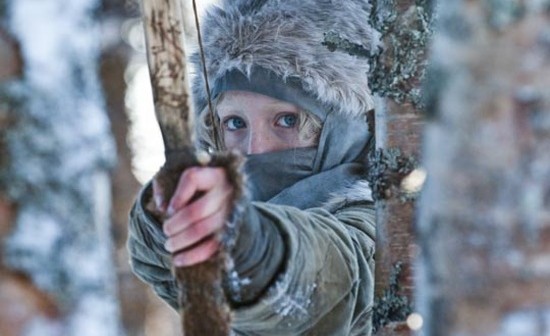Hanna is a 16-year-old girl raised by her father to be the perfect killer. Her relentless combat and survival training in a desolate arctic locale has left her emotionless and devoid of remorse and pity – and she’s probably the most normal character in the film. Director Joe Wright’s latest effort tries so hard to be edgy and different that desperation trumps the minor intrigue brought upon by bizarre characters and situations. The majority of the time, it’s just plain weird. Few movies feature a gay, jumpsuit-clad hitman or an oral hygiene-obsessed government agent sporting designer shoes and southern accents – but there’s probably a reason for that.
Raised to be a ruthless killing machine, young Hanna (Saoirse Ronan) tirelessly trains in the wilds of Finland with her father Erik (Eric Bana). Readying herself for the inevitable confrontation with Marissa Wiegler (Cate Blanchett), the merciless government agent intent on hunting them down, Hanna determines to take a preemptive strike against her opponents and join her father later in Berlin. But when Hanna is tricked into believing she has succeeded, Wiegler hires the sadistic assassin Isaacs (Tom Hollander) to dispose of the young girl. While Erik tries to tie up loose ends and rendezvous with his daughter, Hanna begins to uncover alarming revelations about her past as she attempts to stay one step ahead of her pursuers.
There’s a scene early on, in which Hanna must grapple onto the bottom of a military Hummer as it races over the manhole she’s peering up from. It’s this scene that carelessly topples the suspension of disbelief – her origins, her upbringing and her callous training can all be forgiven, but the Indiana Jones-styled act of clinging to the chassis of a moving vehicle is so utterly unbelievable and ludicrously impossible that it recklessly defines her as more than human. Although her heritage is somewhat of a secret, she’s certainly no superhero.
But it’s clear from the opening scene that Hanna is trying entirely too hard to be cool. Perhaps the awe of young assassins became controversial with Kick-Ass or derivative from Leon and even La Femme Nikita. The thumping techno music ripped from Collateral, accompanied by the frenetic camerawork from The Bourne Ultimatum or Run Lola Run, doesn’t help the situation, stylizing the action and fight choreography to the point of visual nuisance. The notion of giving the villains incredibly peculiar idiosyncrasies is also troubling – Marissa’s tooth fetish and Isaacs’ need for whistling and hermaphrodite performers is puzzling and unnecessary. Why do the bad guys always have to go out of their way to demonstrate how evil, weird or insane they are? Will we forget them if they’re simply villainous?
Hanna’s motto is “adapt or die,” which doesn’t seem to help her when discovering the wonder of a light switch, a showerhead or an electric kettle. She seems too easily startled by harmless things (and oddly preoccupied with flirting over fulfilling her mission) yet totally prepared for bullet mayhem. She spends plenty of time studying picturesque family traditions, human tenderness, and boys; it’s a wonder she can compete against the modern warfare of the CIA. At least the playgrounds for action and adventure are fitting, even if the music, mostly created by The Chemical Brothers (except for the classical “In the Hall of the Mountain King,” most recently heard in The Social Network and The Greatest Movie Ever Sold) gets in the way of clever presentation.

